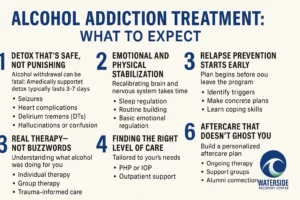You already know something needs to change. Maybe the hangovers have stopped being funny. Maybe you’re hiding bottles and skipping meals. Maybe you’ve caught yourself saying, “I can’t keep living like this”—and actually meaning it.
If you’re considering alcohol addiction treatment, chances are you’ve already wrestled with the big question: Do I really need help?
The answer you’re circling isn’t just yes. It’s this: You deserve real help. Not just to stop drinking, but to start feeling whole again.
At Waterside Recovery’s Alcohol Addiction Treatment program in Plymouth County, we walk with people through this every day. And no—it’s not one-size-fits-all. The process is real. It’s human. And it works when it’s honest.
Here’s a look at what actually goes into effective treatment for alcohol addiction—from day one to long after your last drink.
Step 1: Detox That’s Safe, Not Punishing
Let’s be clear: alcohol withdrawal can be fatal. It’s not something to muscle through alone with water and willpower.
When your body has become dependent on alcohol, quitting cold turkey without medical support puts you at risk for:
- Seizures
- Heart complications
- Delirium tremens (DTs)
- Hallucinations or confusion
- Dangerous blood pressure spikes
That’s why the first step in any serious treatment plan is a medically supported detox. At Waterside Recovery, this doesn’t mean you’re strapped to a hospital bed. It means:
- You’re monitored for safety and comfort
- Medications are used (when needed) to reduce symptoms
- You’re kept hydrated and nourished
- You’re cared for by people who don’t flinch at your pain
This phase typically lasts 3–7 days. Long enough to stabilize. Gentle enough to remind you that healing doesn’t have to hurt.
Step 2: Emotional and Physical Stabilization
Once detox is done, you’re technically sober—but that doesn’t mean you’re steady.
This is where stabilization comes in. Your brain and nervous system need time to re-learn what calm feels like. This period includes:
- Sleep regulation. Rebuilding healthy sleep is foundational for recovery.
- Routine building. Wake, eat, talk, reflect. It’s not glamorous—but it’s what makes sobriety livable.
- Basic emotional regulation. You’ll feel more now. That’s expected. We’ll help you move through it without alcohol.
Without this phase, people often crash into therapy too fast—still emotionally raw, still physically disoriented. Stabilization builds the foundation for everything that comes next.
Step 3: Real Therapy—Not Buzzwords
Good therapy doesn’t feel like a brochure. It feels like being seen.
Individual therapy is where you start unpacking what alcohol was doing for you. Because it was doing something—numbing pain, softening social anxiety, helping you disappear after trauma or loss. We don’t shame that. We explore it.
You’ll work with licensed professionals who specialize in:
- Trauma-informed care
- Anxiety and depression
- Family dynamics and codependency
- Self-worth and identity in recovery
Group therapy is where healing gets mirrored. You’ll hear your own thoughts in someone else’s voice. You’ll learn that your story isn’t strange—it’s shared.
We also include experiential therapies, relapse prevention, psychoeducation, and sometimes family counseling—because healing doesn’t happen in isolation.
Step 4: Finding the Right Level of Care
Not everyone needs the same intensity of support. That’s why treatment works best when it’s tailored.
At Waterside, we offer:
- PHP (Partial Hospitalization Program): This is full-day care without overnight stay. Ideal for people needing strong structure early on.
- IOP (Intensive Outpatient Program): Flexible, part-time care for those transitioning out of PHP or balancing work and recovery.
- Outpatient Support: Weekly sessions for long-term maintenance.
We’ll guide you into the level that matches your needs—not your shame story. If you’re looking for Alcohol Addiction Treatment in Bristol County, we can help you navigate access and scheduling locally as well.
Step 5: Relapse Prevention Starts Early—Not At Discharge
If treatment ends with a graduation certificate, it’s failed you.
We start relapse prevention before you leave our care. That means:
- Mapping your triggers
- Creating a concrete plan for how you’ll respond to stress, grief, and celebration
- Connecting you with local support groups or sober living resources
- Equipping you with coping skills that are actually usable in real life (not just written in a workbook)
We also explore medication-assisted treatment (MAT) options when appropriate—like naltrexone or acamprosate—which can reduce cravings and help you stay alcohol-free longer.
Step 6: Aftercare That Doesn’t Ghost You
What happens after treatment matters just as much as what happens during.
We build a realistic, human-centered aftercare plan that can include:
- Ongoing therapy
- Support group recommendations
- Alumni connections
- Check-ins during high-risk times (holidays, anniversaries, stress spikes)
Some people need more touchpoints. Others thrive with less. The key is personalized support that continues without pressure.
FAQ: Alcohol Addiction Treatment—What You Might Still Be Wondering
Is detox always required?
If you’re physically dependent on alcohol, yes—supervised detox is crucial for safety. We’ll help assess that honestly with you.
What if I’ve already relapsed before?
That’s normal. Many clients return to treatment after relapse. It’s not a sign of failure—it’s a sign that you’re still trying. We support that.
Can I still work while getting treatment?
Yes. Our IOP allows for flexible scheduling. Many clients attend while working part-time or managing caregiving duties.
Do I have to talk in group therapy?
No. You’ll never be forced to share before you’re ready. Listening is participation, too.
What if my family doesn’t understand?
We offer optional family counseling and psychoeducation to help loved ones support your recovery without controlling it.
Is this private? Will anyone know I’m here?
Your treatment is 100% confidential. We take your privacy seriously—legally and ethically.
What Makes Treatment Work?
It’s not about hitting “rock bottom.” It’s not about being strong enough to go it alone.
Effective treatment works because it meets you where you are—then helps you build something new without shame, fear, or pretense.
You don’t have to be fearless. You just have to be willing.
Ready to Begin?
You don’t have to do everything today. You just have to do one thing that moves you forward.
Call (866) 671-8620 to learn more about our Alcohol Addiction Treatment services in Plymouth County, MA.
You’re not too late. You’re not too far gone. You’re just in the beginning.
Let’s go.



